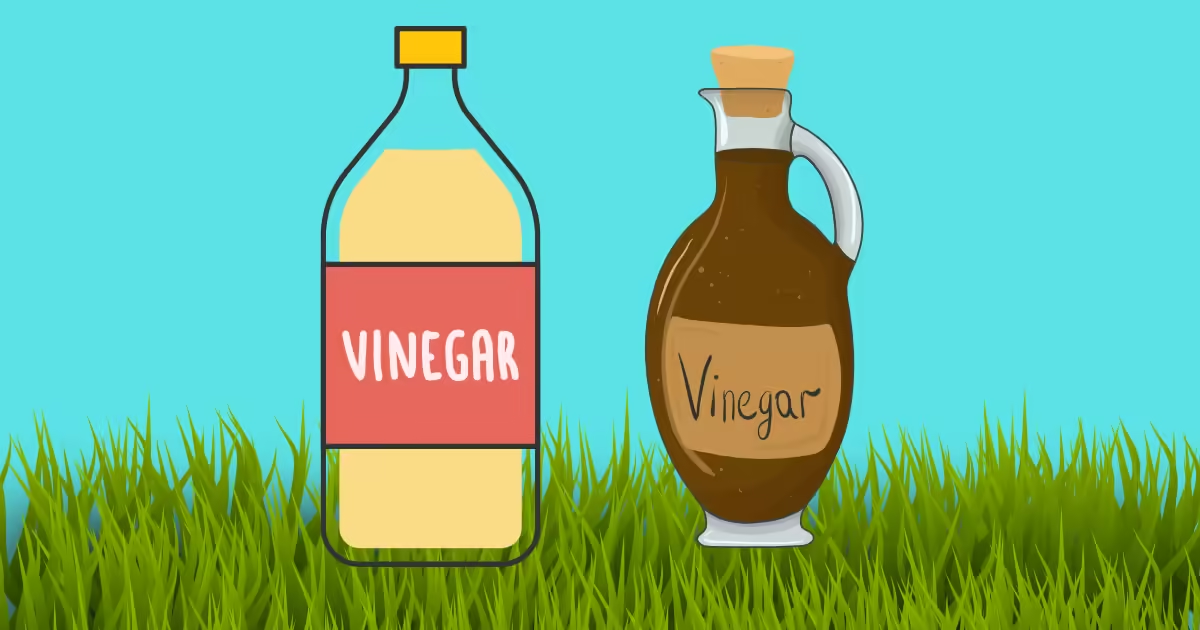Vinegar is a common household product that has many uses, from cleaning to cooking. But did you know that vinegar can also be used to kill grass? This eco-friendly alternative to chemical herbicides has gained popularity among homeowners looking for natural ways to manage their lawns. However, before using vinegar, it’s essential to understand how it works and whether it’s the right solution for your lawn care needs. In this post, we will explore 5 powerful reasons why vinegar is an effective grass killer, how to use it safely, and whether it can provide permanent results.
Will Vinegar Kill Grass? The Complete Answer
Yes, vinegar will kill grass when applied directly to it. The main component responsible for this is acetic acid, which is found in varying concentrations in different types of vinegar. When applied to grass or weeds, acetic acid breaks down the plant cells, leading to dehydration and death.
Vinegar is a non-selective herbicide, meaning it will kill any plant it comes into contact with, not just grass. This makes it effective for killing unwanted grass in specific areas like driveways, walkways, or flower beds, but it’s important to avoid spraying it on areas where you want to keep plants alive. While vinegar can kill the visible parts of the grass, it may not always destroy the roots, which is crucial to keep in mind if you’re looking for a permanent solution.
How to Use Vinegar to Kill Grass Safely
Using vinegar to kill grass is a simple and affordable process, but it requires careful application to prevent unwanted damage to other plants. Here’s a step-by-step guide on how to use vinegar safely and effectively:
- Select the Right Type of Vinegar: For typical household use, white vinegar with 5% acetic acid works well on small areas of grass. For more stubborn or deep-rooted grass, consider using horticultural vinegar with a higher concentration (up to 20% acetic acid).
- Use a Spray Bottle: Pour the vinegar into a spray bottle to ensure precise application. This helps you target specific patches of grass without affecting the surrounding plants.
- Apply on a Dry, Sunny Day: Vinegar works best when applied in direct sunlight and during dry weather. The sun helps speed up the dehydration process, making the vinegar more effective.
- Reapply as Needed: Depending on the type of grass and its growth, you may need to apply vinegar more than once. Monitor the grass after the first application and reapply if necessary.
- Protect Desirable Plants: Use cardboard or plastic to shield any plants you want to keep alive while spraying vinegar on unwanted grass. This prevents accidental damage.
By following these steps, you can use vinegar effectively while minimizing any negative impact on your lawn or garden.
How Long Does It Take for Vinegar to Kill Grass?
One of the most frequently asked questions is, how long does it take for vinegar to kill grass? The answer depends on several factors, including the type of vinegar used, the weather conditions, and the type of grass you are targeting.
In general, you can expect to see results within 24 hours of applying vinegar to grass. The grass will start to brown and wilt as the acetic acid dehydrates the plant. Full death of the grass may take 2-3 days, particularly in hot and sunny conditions. For tougher, perennial grass or weeds, you may need to repeat the application every few days to ensure that the plant dies completely.
It’s important to note that vinegar works best on young, newly sprouted grass. Older, established grass may take longer to kill and may require a stronger solution, such as horticultural vinegar, for full effectiveness.
Does Vinegar Kill Grass Permanently?
While vinegar is an effective short-term solution for killing grass, it may not always provide permanent results. The reason for this is that vinegar primarily attacks the visible parts of the plant, such as the leaves and stems. However, it may not penetrate deeply enough to kill the roots, particularly for well-established grass or perennial weeds.
This means that while vinegar will kill the top part of the grass, the roots may survive and regrow over time, especially after heavy rainfall or watering. To achieve more permanent results, you may need to reapply vinegar several times or use additional methods, such as digging out the roots manually after applying vinegar.
If you are looking for a more permanent solution to remove grass in specific areas, combining vinegar with other mechanical methods, like pulling out the roots or using mulch to suppress regrowth, may be necessary.
Pros and Cons of Using Vinegar to Kill Grass
Before deciding whether to use vinegar to kill grass, it’s important to weigh the pros and cons to determine if it’s the right option for your lawn care.
Pros:
- Eco-Friendly: Vinegar is a natural, biodegradable product that doesn’t leave harmful residues in the soil or water.
- Cost-Effective: Vinegar is much cheaper than commercial herbicides and can be easily found at any grocery store.
- Non-Toxic: Unlike chemical herbicides, vinegar is safe to use around pets, children, and wildlife when applied correctly.
- Easy to Apply: You can quickly and easily apply vinegar using a spray bottle, making it convenient for small areas.
Cons:
- Non-Selective: Vinegar kills all plants it touches, not just grass or weeds, which means you need to be careful when applying it near desirable plants.
- Temporary Results: Vinegar may not always kill the roots of the grass, leading to regrowth after a few weeks.
- Limited Effectiveness on Tough Weeds: While vinegar works well on young or annual weeds, tougher perennial grasses may require repeated applications or stronger solutions.
By understanding these pros and cons, you can make a more informed decision on whether vinegar is the right solution for your grass-killing needs.
What Type of Vinegar Is Best for Killing Grass?
Not all vinegars are equally effective when it comes to killing grass. The two most commonly used types of vinegar for weed and grass control are white vinegar and horticultural vinegar.
- White Vinegar (5% Acetic Acid): This is the type of vinegar most commonly found in households. It is suitable for smaller applications, such as killing grass in cracks, walkways, or flower beds. It’s effective on young or small weeds and grass but may require multiple applications for more established plants.
- Horticultural Vinegar (20% Acetic Acid): This type of vinegar is much stronger and is typically used for more difficult-to-kill grass or weeds. It’s highly effective but should be handled with care, as the high acetic acid concentration can cause skin irritation and damage if used improperly.
For general use, white vinegar works well on small areas and for short-term control, while horticultural vinegar is better suited for tougher, perennial weeds.
Can Vinegar Kill Weeds Without Harming Grass?
Vinegar is a non-selective herbicide, meaning it will kill any plant it comes into contact with, including grass. This means it’s not possible to use vinegar to kill only weeds without also damaging the surrounding grass. If your goal is to kill weeds without harming the rest of your lawn, you may want to consider using vinegar in more controlled ways, such as:
- Spot Treatment: Apply vinegar directly to the weeds using a spray bottle, being careful to avoid spraying nearby grass.
- Barriers: Use barriers like cardboard or plastic sheets to protect desirable plants from the vinegar while treating specific weeds.
For larger lawns, vinegar may not be the best choice if you’re looking to selectively remove weeds without affecting the grass.
Vinegar vs. Chemical Grass Killers: Which Is Better?
When it comes to choosing between vinegar and commercial chemical herbicides, there are several factors to consider.
- Effectiveness: Commercial herbicides tend to be more effective in killing grass and weeds because they penetrate deeper into the soil and kill the roots. Vinegar, on the other hand, primarily affects the top part of the plant and may not always kill the roots.
- Safety: Vinegar is a safer alternative for households with pets and children, as it doesn’t contain harmful chemicals. Chemical herbicides, while effective, may pose health risks if misused.
- Cost: Vinegar is generally cheaper and more accessible than commercial weed killers. However, if you need a long-term solution for large areas of grass, investing in a stronger commercial herbicide may save time in the long run.
Ultimately, the choice between vinegar and chemical herbicides depends on your lawn care goals, budget, and whether you prioritize safety over long-term effectiveness. For an even deeper dive into unique evergreen trees that bring beauty and fragrance to your garden, explore our detailed guide on the evergreen tree with aromatic wood.
Conclusion: Is Vinegar the Right Choice to Kill Grass?
Vinegar can be a powerful and eco-friendly solution for killing grass in small areas, particularly in gardens, walkways, and flower beds. It’s an effective option for homeowners who prefer a natural alternative to chemical herbicides. However, it’s important to remember that vinegar is non-selective, meaning it will kill any plant it touches, and it may not provide permanent results for well-established grass or weeds.
For larger or more stubborn patches of grass, you may need to consider combining vinegar with other methods, such as manually pulling out the roots or using mulch to prevent regrowth. Overall, vinegar is a great choice for small-scale lawn care but may not be the best option for those seeking long-term results in larger areas.
FAQs About Using Vinegar to Kill Grass
- Will vinegar kill grass permanently?
Vinegar can kill grass, but it may not always kill the roots, meaning the grass could regrow. - How long does it take for vinegar to kill grass?
Vinegar typically starts working within 24 hours, with full results visible in 2-3 days. - What type of vinegar is best for killing grass?
White vinegar with 5% acetic acid is effective for small areas, while horticultural vinegar with 20% acetic acid works on tougher grass. - Can vinegar harm the soil?
Vinegar temporarily lowers the pH of the soil, but it doesn’t cause long-term harm to soil fertility. - Is vinegar safe to use around pets and children?
Yes, vinegar is a non-toxic alternative to chemical herbicides, making it safe for use around pets and children. - How often should I apply vinegar to kill grass?
You may need to reapply vinegar every few days for tougher grass or weeds to ensure the plant dies completely. - Does vinegar kill the roots of the grass?
Vinegar primarily affects the leaves and stems. It may not penetrate deeply enough to kill the roots of larger plants. - Is vinegar better than chemical herbicides?
Vinegar is a safer, eco-friendly option but may not be as effective as commercial herbicides for long-term control of large areas. - Can I mix vinegar with other ingredients to make it more effective?
Yes, some people mix vinegar with dish soap or salt to improve its weed-killing power. - Will vinegar kill grass in winter?
Vinegar is most effective in warm, sunny conditions. It may not work as quickly in colder weather.

Joseph Bush is a seasoned writer and researcher with over 7 years of experience covering a wide range of general topics, from lifestyle and technology to business and current events. He is dedicated to producing fact-checked, reader-friendly content that informs, engages, and empowers readers.
Throughout his career, Joseph has followed strict editorial guidelines, relied on reputable sources, and ensured every article meets the highest standards of accuracy and clarity. His expertise spans multiple fields, allowing him to explain complex topics in a way that’s easy to understand.
Passionate about continuous learning, Joseph stays updated on industry trends and best practices to deliver trustworthy, well-rounded insights. Readers can rely on his work for its credibility, depth, and real-world relevance.




